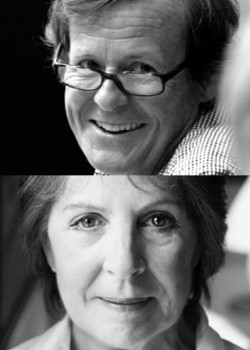Michael Coveney: Hare and Wilton trumpet the National, with more notes for Norris
A platform discussion as part of the National Theatre’s 50th anniversary celebrations prompts some big questions for our chief critic

David Hare and Penelope Wilton told their "National Histories" in a pretty full Olivier auditorium before the performance of Edward II last night, chaired by Royal Court literary manager Christopher Campbell (once an actor himself at the National). And wonderful stories they were, too, partly prepared by a series of questions they'd had sight of earlier. Hare, answering the one about "unsung heroes" with an appreciation of Nicholas Wright, the best literary manager he had ever known, said that the NT chairman, John Makinson, had asked him, prior to Rufus Norris' appointment, what was the most important quality the new artistic director should have.
"A knowledge of the repertory," said Hare. "Ah, well," said Makinson, "that reduces the candidates to just two." And neither of them, by his own admission at yesterday's press conference, was Norris. This is going to be a major problem. A National Theatre simply must engage with the classics, and foreign theatre, on a serious and systematic basis, as well as doing all the other admirable "new work" things hinted at yesterday, and Norris needs to think long and hard about appointing his own new literary manager. Perhaps David Hare can advise him before they start work together on Hare's new play.
Penelope Wilton's "unsung hero" was the NT's head of print and publications, Lynn Haill, who edits the programmes which remain every bit as good and interesting as they were when Kenneth Tynan took care of them for Olivier. And, Hare added, Lynn's influence has even helped raise the standard of programmes in the West End. This is undoubtedly true.
The session got off to a great start with the surprise revelation that both Wilton's and Hare's first ever NT show was the Michael Redgrave Uncle Vanya at Chichester: Wilton remembered Redgrave's too short jacket and red hands (he'd been working on the estate); Hare had been taken from school (nearby Lancing College) and said that absolutely nothing had dated about the performance – the cast included Olivier as Astrov and Joan Plowright as Sonia – as you can see for yourself on a recording readily available on YouTube – and he thought, well, this is the theatre, then, that's good!
The implicit point being, of course, that not everything has been that good since. For her favourite performance, Wilton chose Olivier's surprising Shylock, directed by Jonathan Miller, in which the actor was at his most muted, a Rothschild-like 19th century banker in a pin-striped suit and a skullcap.
Hare – who worked as an usher in the Old Vic era; while Simon Callow was in the box office? – said that Albert Finney did something remarkable and different at every performance of Congreve's Love for Love, but he was even more taken by Lynn Redgrave in the same play, who unfailingly looked as though she had simply come in off the street, bringing with her a rare and unsurpassed gift for unforced laughter. How she did this remains a mystery to him to this day.
And asked which was the NT highlight they themselves had been involved in, Wilton – while referencing her own fine performance as the frosty politician Marion French in Hare's The Secret Rapture (1988) – plumped for Harold Pinter's Betrayal (1978) which received initially poor reviews but which exerted a great public appeal and has done ever since. Hare unsurprisingly plumped for his trilogy of plays about the church, the law and the Labour Party in 1993, reporting that Jocelyn Herbert, the great designer who had been involved in the NT planning, said that Bob Crowley's amazing designs were the first to reveal the Olivier in the way they had first envisaged it.
On the "fantasy programme" question, Wilton included Maggie Smith in both The Recruiting Officer and Hay Fever (a three-minute “lost” snippet of which will be shown at the NT gala on 2 November, Hytner revealed on Libby Purves’ Radio 4 Midweek programme this morning, before Maggie herself appears in the flesh to reprise her matchless Mrs Sullen in Farquhar’s The Beaux Stratagem); while Hare, applauding the two most talented and brilliant new plays in the recent repertoire, James Graham's This House and Frances Ya-Chu Cowhig's The World of Extreme Happiness, lamented the lack of visiting foreign and regional companies, wanting to see much more of them in the future; another conversation one hopes he has with Norris.
I loved the "favourite spot in the National" question, with some hilarious answers from Wilton concerning exchanges and huddles in prompt corners and ditto from Hare about least favourite spots – any theatre restaurant, although he was pleased to say that he met his wife, Nicole Fahri, for the first time in the benighted and seriously mis-named "Ovations" eaterie that preceded the NT’s Mezzanine.
As it happens, for the first time in my NT going career, I had opted to have dinner with my guest in the Mezzanine after the show; the steaks were fine, but the atmosphere was grim and the service terrible, and the adjacent table of badly dressed ancient suburbanites absolutely intolerable, talking rubbish at the top of their voices before going home to Sevenoaks.
They had been there all evening, and not with us watching Edward II, which is an imaginative and provocative production by Joe Hill-Gibbins, with a tremendous performance by Kyle Soller as Gaveston doubling as the murderer Lightborn. John Heffernan sounded very hoarse, but he had scenes of great stillness and emotional intensity as the emaciated king in the second half. There's just a lack of overall personality in the company and insufficient grace and technique in delivering Marlowe's wonderful text. More Hare notes for Norris? And for Hytner, too, perhaps, who still has 18 more months in the saddle…












